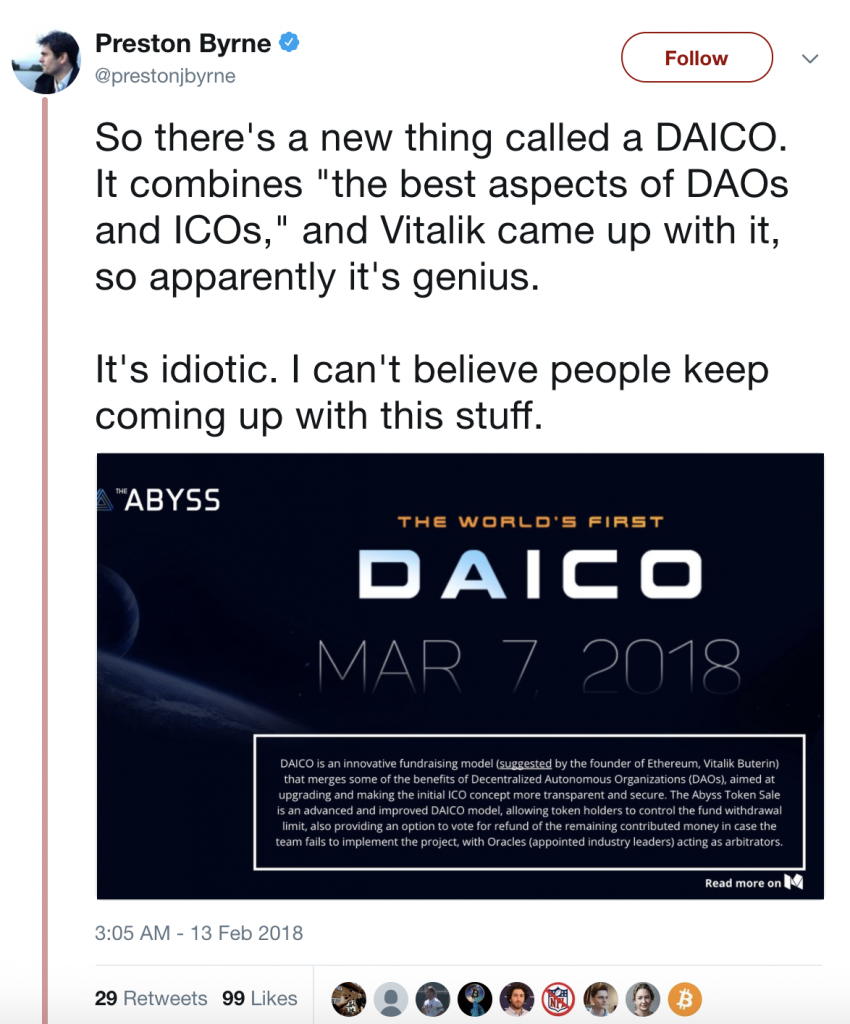You’ve probably heard of The DAO and you’ve certainly heard of the ICO. Now say hello to the DAICO, an “innovative fundraising model” that aims to combine the best of both frameworks. The Abyss Platform is the first project to utilize this hybrid organizational structure, which has been credited as the brainchild of Vitalik Buterin. There’s just one problem with The DAO, the ICO and the mutant DAICO it’s spawned – the public couldn’t give a damn about key tenets such as voting rights and community governance. All they want is cheap tokens they can flip for a quick profit.
Also read: U.S. Corporate Customers Barred From Bitfinex’s Margin Markets
Live and Let DAICO
The DAO (decentralized autonomous organization) was the first major project to be launched on the Ethereum blockchain, complete with a novel governance structure that replaced a board of directors with a community-run model. It didn’t end well. A vulnerability in the code saw one third of the ether committed to the project stolen and The DAO collapsed. As prominent crypto critic and agent provocateur Preston Byrne explains:
The original DAO could pass resolutions with a simple majority drawn from quorum of 20% (meaning as little as 10% +1 of the investors could bind the remaining 90%). No resolution ever passed because none of the tokenholders actually cared enough about what the DAO was doing in order to participate. Their primary motivation was to sit on their hands and wait for their investment to pay off.
Byrne may be a perennial bitcoin bear, but as a practising English solicitor, he knows more than most when it comes to the sort of legal matters that DAOs and DAICOs were meant to solve. Take a look at many of this year’s ICOs and you’ll find, somewhere in their roadmap, talk of token holders being empowered to vote on key protocol changes including platform developments and new features. It all sounds very progressive and democratic, but the trouble is even the loyalest of community members don’t care enough to want to micromanage decisions using the power invested in them by tokens. The real reason why ICOs are so eager to assign voting rights to their investors is to add legitimacy to their claim that the token is a utility and not a security.

Good Intentions Lost in the Abyss
The Abyss “merges some of the benefits of Decentralized Autonomous Organizations (DAOs), aimed at upgrading and making the initial ICO concept more transparent and secure”. It allows “token holders to control the fund withdrawal limit, also providing an option to vote for refund of the remaining contributed money in case the team fails to implement the project, with Oracles (appointed industry leaders) acting as arbitrators.” The idea is plucked from a concept Vitalik Buterin mooted a few weeks back.

In his scathing critique of the DAICO, Preston Byrne writes: “I feel like I’m taking crazy pills here, because the SEC literally wrote a report about the original DAO scheme, likened it to a security, and cited as authority for this proposition not one but TWO cases relating to an infamous 1970s pyramid scheme that landed its promoter in federal prison for nearly a decade.”
He finishes: “A DAICO is nothing more than a new acronym for the same old bad ideas. The broken DAO concept, in particular, requires extensive rethinking and movement onto private/permissioned blockchains in order to shed its pyramid scheme-like qualities and serve a useful function. On account of which I am completely amazed that anyone would want to combine the DAO and ICO concepts under any circumstances.”
Original thinking deserves a chance to flourish, and blockchain governance – for all its pitfalls – may yet find a way to work. It probably won’t arrive in the form of the DAICO though or any of the other “revolutionary” governance models being used to float the current crop of crowdsales. Good ideas will ultimately prevail, while the ones deemed too wacky and unworkable will return to the abyss that spawned them.
Do you think blockchain democracy and token-based voting is a viable concept, or is it destined to fail? Let us know in the comments section below.
Images courtesy of Shutterstock, Twitter, and Ethersear.ch.
Get our news feed on your site. Check our widget services.
The post Token Holders Don’t Give a Damn About Voting Rights and Community Governance appeared first on Bitcoin News.














